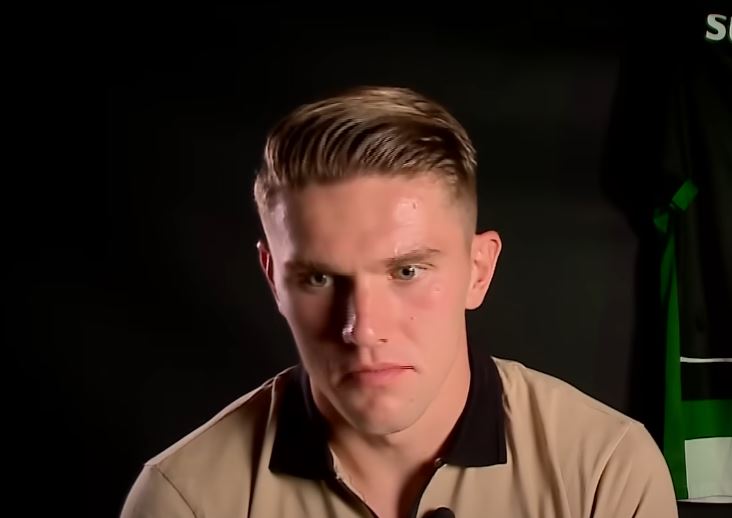
Viktor Gyökeres has transformed from a Championship prospect to one of football’s most sought-after strikers in the last season. His pay increase from Sporting CP to Arsenal is a result of both his scoring prowess and the advantageous convergence of squad demand and market timing. Arsenal made a strategic, forward-thinking choice by offering him £200,000 per week, with the intention of bolstering their front line with a highly skilled finisher who has already recorded a season with 50 goals or more.
Gyökeres established himself as a solution Arsenal couldn’t overlook by capitalizing on impressive results in both domestic and European competitions. His pay represents more than just a monetary commitment; it also reflects Arsenal’s increasing belief that the time has come to cement title aspirations. A striker with Gyökeres’ build, finishing ability, and off-the-ball instincts could be especially revolutionary in Mikel Arteta’s developing system.
Viktor Gyökeres Career and Personal Profile
| Category | Information |
|---|---|
| Full Name | Viktor Einar Gyökeres |
| Date of Birth | June 4, 1998 |
| Age | 27 |
| Nationality | Swedish |
| Position | Centre Forward |
| Current Club | Sporting CP (transitioning to Arsenal) |
| New Club | Arsenal FC |
| Contract Duration | 5 years (2025–2030) |
| Weekly Salary | £200,000 (Arsenal, projected) |
| Annual Salary | Approx. €9.3 million |
| Previous Salary | Approx. £39,000 per week (Sporting CP) |
| Career Peak Season | 2024–25: 54 goals in all competitions |
| Transfer Fee | €73.5 million total (including €10M add-ons) |
| Release Clause | €100 million (Sporting CP) |
| Notable Clubs | Coventry City, Brighton, St. Pauli, Swansea City, Sporting CP |
The increase in his income relative to his peers is remarkably comparable to how clubs redesigned their pay scales for up-and-coming athletes like Declan Rice or Jude Bellingham. Although Kai Havertz makes about £290,000 a week at Arsenal, Gyökeres’ impact in the final third might soon surpass the German’s. Arsenal is gradually changing the structure and ambition of their attack through strategic hiring.
Gyökeres’ decision to reportedly waive about €2 million from his prior contract in order to complete the move is one of the more intriguing details. Even though such a gesture is not new, it is especially telling. It reflects the attitude of athletes who value their athletic legacy more than immediate financial gain. He might win over the Emirates supporters more quickly with this choice than with any preseason objective.
His 54 goals in the 2024–25 campaign weren’t just inflated numbers; they were game-changing, cup-winning, and Champions League goals. A gap that has plagued Arsenal’s team for a long time is being directly filled by bringing in a player with that level of output. Kai Havertz’s inconsistent play and Gabriel Jesus’ fitness issues left the No. 9 spot feeling unfinished. Gyökeres offers a quick, powerful solution.
Rio Ferdinand and Troy Deeney, two former pros, have recently offered significantly different viewpoints. Ferdinand made comparisons to Osimhen and suggested that Arsenal may have put price above any potential ceiling, while Deeney questioned why the club had taken so long to complete the transfer. Such divergent opinions, however, only highlight Gyökeres’ importance in the current football conversation.
From an economic perspective, Gyökeres’ pay is surprisingly low when compared to the performance index. When spread over shirt sales, ticket sales, and European revenue, the wage structure of £200,000 per week over five years becomes extremely efficient for a striker who scores more than one goal per game. This is similar to the way Haaland’s deal at City was presented: costly on paper but incredibly profitable when taken as a whole.
Gyökeres will be the focus of media and branding campaigns as part of Arsenal’s relaunched international campaigns, which include preseason trips to Asia and the United States. Similar to how Ødegaard’s leadership helped expand the club’s Nordic audience, his Scandinavian heritage may lead to new business opportunities. As a result, the salary is an investment in a marketable identity that supports athletic objectives rather than merely compensation.
Gyökeres will have time to assimilate Arteta’s tactical demands if he joins the team in the off-season. The forthcoming friendlies could offer a noticeably better first impression, particularly when they feature rivals like Manchester United. If he succeeds right away, net-bulging results will swiftly silence those who criticize his pay.
Transfer fees make headlines in today’s football world, but wage structures frequently dictate sustainability. Arsenal seems to have achieved a careful equilibrium. They are preserving flexibility while expressing confidence in Gyökeres’ output by keeping his pay below that of their highest earners. Considering the club’s past issues with overpaying aging stars, this strategy is especially creative.
As long as there are goals, the numbers won’t matter to the supporters. However, a number of performance standards, strategic aspirations, and marketing expectations are hidden behind each weekly deposit into Gyökeres’ account. The salary will not only be justified but also celebrated if he performs well in crucial games, such as the North London derbies, Champions League knockouts, and late-season deciders.
